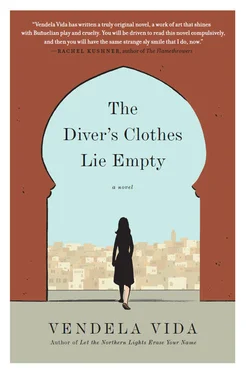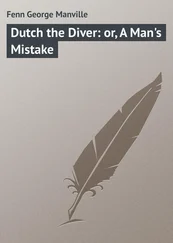In an hour the bus approaches the small city of Meknes. You see the long ocher wall of an old city, a green minaret in the distance. The tour guide, who has short black hair and a compact body, looks around thirty. He stands with a microphone, and after telling you that he has a degree in history, he begins a lecture about the history of Meknes: how it used to be the capital of Morocco, how the sultan Moulay Ismaïl, who reigned in the seventeenth century, was known as the Sun King of Morocco. He built everything on a massive scale, surrounding the city with walls and bastions and protecting it with monumental gateways. You stop listening and stare out the window. Though the walls are high, the city looks small and manageable next to the chaotic expanse of Casablanca.
The bus stops in a large parking lot, next to other tour buses. You descend from the bus and your group of three dozen forms a bloblike shape in the dusty lot. A half-dozen men in caftans, some with vertical black stripes and others a solid oatmeal color, hold small, squat stools and offer to polish shoes. The tour guide barks at them, driving them away. Then he makes an announcement that you will start off touring the Sun King of Morocco’s former palace and stables before walking through the souks. He warns you that the streets are mazelike and confusing and emphasizes the need to stick close together. He tells you he will be carrying a large green umbrella so you can follow it if you get lost. As he announces this, he opens the umbrella and holds it up so you can see what a large green umbrella looks like.
While you are listening to the tour guide who once studied history, and seems intent on telling you everything he once learned, three white vans pull up. Fourteen or so men and a few women emerge from the vans. Many of them are wearing vests, some are carrying tape recorders and cameras. The average age of the group is twenty years younger than your tour group. If you’re not mistaken it’s a press pool — the journalists are surrounding a man who appears to be some kind of dignitary. They’re taking photos, writing down what he says.
The shoeshine men approach them, and are again promptly dismissed.
“What’s going on there?” one of the shrinking husbands in your group asks the tour guide. The guide looks over at the press pool.
“I think it’s the ambassador from Nigeria,” he says. “I read in the paper that he would be in town with his entourage. We will let them go first. Not that we have a choice. They always get to go wherever they want. I’ve heard they don’t even need passports since they fly on private planes.” The tour guide looks as though he would spit if it didn’t make him look undignified.
You are envious of how quickly the press pool seems to move. They don’t need to stand outside the palace being lectured about how they will be following an umbrella. The press pool moves together with energy and zest. They make their way into the palace quickly, and are out of sight.
Meanwhile you are still standing in a dusty parking lot with a group of elderly Americans being lectured about the Sun King of Morocco. The tour guide tells you the king had six hundred wives from all over the world. Half of your tour group makes some sort of exclamation. “Don’t get any ideas, honey,” one of the women says to her shrinking husband. Everyone in the group laughs.
“He also had countless children,” the tour guide continues. How many children might he have had with six hundred wives? You do the math. You don’t think you’ve ever heard the word “countless” used so correctly. You wonder how often the king would visit each wife. Once a year? Did he have a favorite? He must have had a favorite he returned to over and over again. You imagine how the other wives felt toward her.
You quickly learn that this must be a very cheap tour. Your guide doesn’t lead you into the palace’s rooms, but instead escorts you to the stables, which are now a series of drab walls with arches. “Arab historians claimed that the royal stables could hold a cavalry of twelve hundred horses,” the guide informs you. The walls are crumbling, the architecture plain and, aside from its immensity, unremarkable. Everyone in your group takes photos, hundreds of photos.
You are already tired of the group, of its glacial pace. It gets worse when you exit the stables and move into the souks.
The narrow, twisting alleyways of Meknes cannot accommodate a tour group of this size. You follow the group through multiple arches. Shoes for sale dangle like mistletoe. You look up and are afraid of a sole slapping your face, so you immediately bring your head down again. You pass a small narrow shop where a man dressed in white weaves an ivory tablecloth with incredible speed. His hands are moving so quickly you can barely make out his fingers. The man’s young son stands several feet in front of him, his short young arms extended, each hand holding an enormous spool of thread for his father.
As the group squeezes through the narrow alleyways you’re ashamed to be part of a tour. You’re ashamed of the guide, who carries an opened umbrella above his head though there’s no chance of rain and speaks loudly, too loudly. You try to tune in to other sounds. Around you chickens squawk though you can’t see them and tourists barter with shopkeepers. You inhale the scents of meals being cooked in the apartments above. You smell saffron, garlic, lamb. You are suddenly ravenous. It’s approaching lunchtime.
Several members of your group want to stop in a shoe store. “There’s a better one ahead,” the tour guide says. “We’ll be there in a few minutes.” You suspect that the tour guide has an agreement with some of the shopkeepers, that he gets compensation for bringing his group to some vendors rather than others.
You pass silversmiths hammering away at small black sculptures of gazelles. You come face-to-face with the head of a stag for sale. You pass dozens of rug shops, the rugs displayed on walls like tapestries. They smell of sour heat, like clothes that have just been removed from a dryer after remaining wet for too long. You pass a fruit stand with oranges stacked in a triangle, apples in a miniature hill.
As you make your way through the narrow maze, following the ridiculous umbrella, your group forces all other humans to the walls. There are other tourists, yes — some of them dressed in caftans — but also local men, women, and children trying to get on with their day, trying to return to their homes that sit behind the short doors that line the streets. Men carrying crates and stools, and women weighed down by heavy plastic bags filled with groceries and fabric, turn sideways to squeeze past your group. You see the frustration and annoyance on their faces, and you understand. You and your group are an obstacle. You’re tempted to run away from the group but that would serve no purpose: the marketplace is so labyrinthine and tight that you’re afraid you’ll become lost; you’re afraid that as a single traveler alone you’ll be more conspicuous. As it is now, the locals’ hostility can be directed toward a tour group and not toward you. You stick close to the group as you navigate the cobblestoned streets. Every few minutes, a member of your group trips.
The guide leads you into a shoe shop and greets the owner warmly by name, confirming your suspicion that he has an agreement with this one. “These shoes are called babouche,” the tour guide says. “They are for men and women. My friend here makes beautiful ones.” The shoes are pointed leather slippers. They come in turquoise, lime green, and the bright colors of berries. The heel of one slipper is tucked into the other, and they’re displayed on the wall in an organized pattern. Not unlike decorative tiles, you think. No space of the wall is left uncovered. The small shop smells of leather, and now that it’s been taken over by your group, the leather scent has been combined with the stench of body odor. You buy a pair of orange slippers for your mother.
Читать дальше












